Ben Hewitt's Blog, page 29
February 5, 2016
First Boil
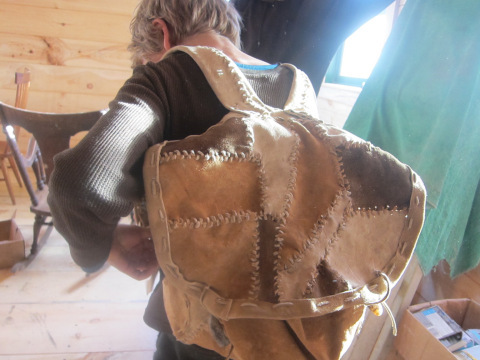
Homemade buckskin backpack
This strange half-winter endures. Last night I drove a narrow dirt lane, the track made almost riverbed-like by mud and standing water. The truck sluiced between the road’s shoulders, riding the ruts and channels, and I passed a sugarhouse in full boil, steam thick above it, obscuring the emerging night sky. The door was open. I knew the people inside, could picture them gathered around the front pan, full of the first boil’s nervous energy. They’d be hot, down to tee shirts, faces shiny with sweat and evaporated water.
I slowed and thought to stop, but already I was late to retrieve my sons from the dairy barn where they do chores twice weekly, so I put my foot back to the gas and kept rolling. Soon the sugarhouse was distant in my rearview mirror, and then I made a right turn onto another mudded road, and when I looked over my shoulder all I could see was that dense cloud of steam hanging in the too-warm February air.

February 3, 2016
Sometimes I Just Stand There
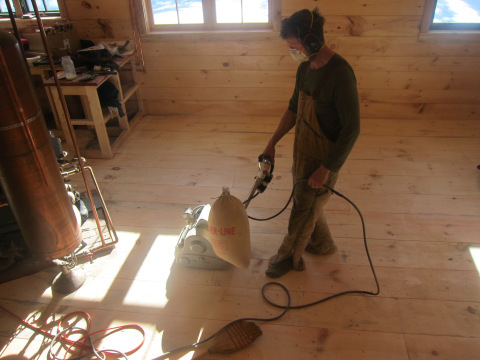
Sanding the floor
Over the weekend we began the move from barn to house, hauling our dressers out the sliding door that connects hay storage to the cows’ run-in shed. This necessitated navigating a minefield of bovine feces, frozen into ankle-twisting mounds like some strange winter-blooming ground fruit.
I was in a foul mood for no reason other than I’d chosen to be. I knew this, yet could not bring myself to choose otherwise, and as I trudged between barn and house and back again, bent under the weight of our furnishings, weaving an unsteady path through the shit, I marveled at the fickle nature of human emotion. I could identify no root cause of my sourness; indeed, all evidence supported ebullience or, at the very least, a base level of garden variety contentment, for here we were, after three months of barn living, with its myriad demerits, moving onto greener pastures. A doubling of space, a counter top, a sink, and so on. Eventually, even a shower! Much of it still crude by contemporary first-world standards, but hey.
Someone asked in the comments section a while back if I thought we’d be as content with our rustic circumstances if we didn’t have something more commodious pending, how we’d feel if we understood that rather than a being a mere blip in the timeline of our lives, that single room in the barn was as good as it gets. Good as it’d ever be. From here until forever more, that one room, the cold floor, the two bare bulbs, the iced-over windows. And so on.
I thought about this a while, and that led me to thinking about that interview with Stephen Jenkinson I mentioned a while back, in which he talks about hope, and, specifically, how dangerous it can be. Because of course hope is always a future tense condition; you cannot hope for the present moment or for your current circumstances. Thus hope becomes a leash that pulls you incessantly forward, out of this moment and into some unknown future that, no matter how fervently you hope (pray, dream, aspire, wish), might well be no better than the present.
In this manner, hope becomes (or at the very least risks becoming) an anesthetic, a painkiller for what exists in the here and now. Thus sedated, the urgency to affect real change becomes less pressing. It’s easier to simply endure and continue lathering on the hope. Jenkinson talks about being “hope-free” rather than hopeless, a condition I interpret as one of clear-eyed pragmatism, marked by an understanding that neither hope nor hopelessness ever changes one’s life for the better. I’d also add cynicism to that list, because what is cynicism but hopelessness with intellect?
I don’t necessarily agree or disagree with this view, although it’s true I’m not much of a hoper. But it’s also true that my life is an embarrassment of riches; materially, I want for nothing, and all the hope in the world will have no impact on my family’s continued health and well-being. And while I might bemoan the myriad outrages of our political and economic institutions (to name just two of the institutions that compel me to launch into one of my frequent mouth-foaming tirades, particularly if I’m onto a second beer and in the presence of like-minded company), I know that hoping for their reform will change nothing.
So. Would I have been as content living in our barn if the house were not on the horizon? I suppose I cannot say, because that was never our circumstance. Indeed, we did know the house was pending, and maybe that’s what allowed us to inhabit the barn with relative equanimity, sort of like how you endure quinoa and kale casserole because you know there’s banana cream pie for dessert.
It’s nice to be in the house, although there is still plenty to do: Interior walls to frame, wiring to complete, french doors to hang (arched, no less!), a tub/shower to install, and so on. Enough to keep us busy on a part-time basis for weeks, if not months, to come. But for now, we’re in thrall to all those rediscovered conveniences we lived without for the past few months. Thanks to the handiwork of our friend Paul, who artfully rigged up an antique copper boiler tank to our wood cookstove, we even have hot water at the kitchen sink. Can you imagine? Hot, running water. Sometimes I just stand there, running it over my hands until my palms turns pink and tingly.

January 24, 2016
In the Night
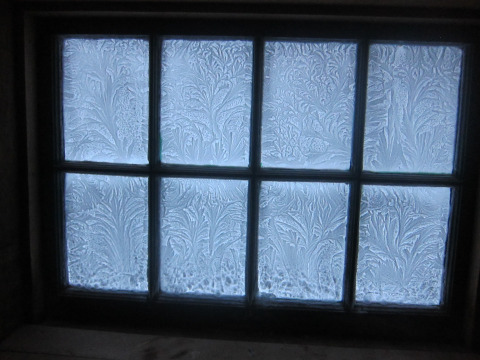
Morning ice on inside of barn windows
In the night the skies were clear and the moon was fat, and when I awoke the light through the windows was so bright that for a moment I thought I’d overslept. I slipped down the stairs for a pee, close enough to the cows that I could hear their exhales, watch the rise and fall of their long ribcages. Those big, big lungs. I could picture the mottled pinkness of them, could almost feel the rubbery warmth of them in my hands. Heavier than you’d think.
I thought to stand for a moment longer than my business necessitated, but it was zero or maybe less, so once relieved I made fast for the nest of our bed. I slept soundly in that strange milky light, dreaming of nothing (or nothing I remember), and when I rose again, the moon was faint in the sky.

January 20, 2016
Then Again
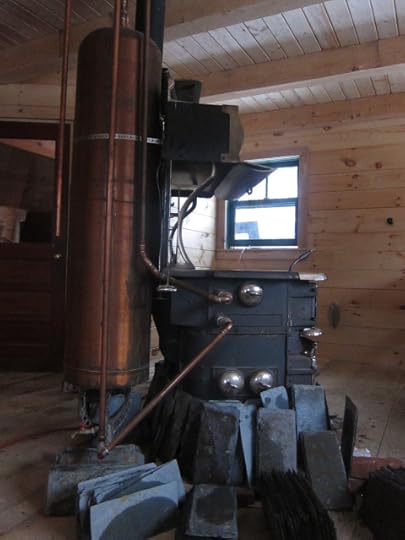
Slate tiles drying by the cookstove
In the evenings we sprawl across a trio of futons unrolled from the corner of the barn, and the seven of us – four humans, two cats, one dog – slumber shoulder-to-paw, hip-to-tail. While we sleep, the fire dies and the barn goes cold, and in the morning the single-pane windows are opaque with the frozen accumulation of our exhalations. I light the fire by headlamp, slip out of the barn, shuffle to the house in the newly-fallen snow – every night now another inch or two – and light a second fire. I make coffee and wait for daylight. Then chores.
On Saturday, we traveled to Burlington to see Davy Knowles. You may not be familiar with Davy – he’s not exactly a household name – but for anyone drawn to contemporary blues, or for anyone who appreciates prodigious musical talent, or for anyone who simply wants to hear SOME OF THE MOST FRIGGIN’ AMAZING MUSIC ON THE FACE OF THE GREAT SPINNING BALL OF SOIL AND STONE WE CALL EARTH, I cannot recommend him highly enough. (Try this, this, and especially this)
We do what we always do at small, general admission shows, which is arrive early enough to stake a claim at the very edge of the stage. As such, I could tell from the moment Davy and his bandmates walked out that this was going to be a good show – I could see the smiles on their faces, the bounce in their steps, the frequent brief exchanges between them. In short, it was clear they were happy to be there. Maybe they were excited by the size of the crowd, which had grown to 300 or perhaps a bit more. Maybe they were still riding the buzz of a fine meal, a beer or two. Maybe they were just in a good mood. But for whatever reason, they were into it, and I could tell. Everyone could tell.
Davy is young (late 20’s), and a guitar prodigy. Story goes he started playing at 11 when he heard Dire Straits’ Sultans of Swing on the radio and figured it out by ear; Mark Knopfler is not exactly your standard beginner’s material. A lot of technically proficient musicians seem to sacrifice something to their proficiency; call it “soul,” if you will, or think of less-trite terminology. Or maybe it’s exuberance that’s lost. Yeah. Exuberance. I think that might be it.
There was no exuberance lost on that stage, that’s for sure. About halfway through the show, I realized my face hurt; I’d been smiling so widely and constantly, the muscles in my cheeks actually ached. Yet still I could not stop, for there was such purity of joy in the performance, it simply could not be denied.
At the end of the show, with the crowd erupting, Davy and his band walked off stage. As Davy was departing, he came to where we stood, knelt down, and gave each of my sons a big smile and one of the guitar picks he’d just used to play the music that had made my face hurt. Then he was gone.
I can’t quite stop thinking about Davy’s performance (and his band – because Davy’s a bit of a guitar hero, his bandmates maybe don’t get as much attention as they deserve). But equally, I can’t stop thinking about his gesture of graciousness toward my sons. It was nothing, really – just a couple chips of nylon, just a couple seconds of his time – but it was one of those small acts that transcends its own boundaries, if that makes any sense.
Someone once explained to me that kindness is like throwing sparks. You throw and you throw and you throw, and most of the time, those sparks just sort of sputter and die. Or they land in water. Or they’re simply rebuffed. Because there’s a certain vulnerability to kindness, there’s a certain inherent risk, and as such, it’s easy to get discouraged. It can feel as if it’s easier to stop throwing, stop risking.
But every so often, one of those sparks strikes a bit of tinder. I believe that’s why I’m still thinking about that concert. In part, it’s because I was witness to an artist entirely in his element, and as a so-called “creative,” I felt the impact of that deeply, and with it, the desire to capture some of Davy’s energy in my own work, although I have no idea whether or not that’s possible, though I think it is.
But it was Davy’s small kindness toward my sons that struck me the most, because it forced me to acknowledge the ways in which I have not been similarly gracious. For reasons I don’t entirely understand, it makes me uncomfortable when people email me to say that something I’ve written has touched them, and so sometimes I simply do not reply, leaving them exposed in their vulnerability, and worse yet, perhaps less likely to risk such vulnerability again. From time-to-time, something similar happens in person, and I although I am generally a fairly warm and out-going fellow, I suspect I do not always respond with equivalent grace.
Now I wish I had a guitar pick to send to everyone who’s every emailed, or left a comment, or just read something I wrote. But I don’t, and maybe that’s good, because the logistics are frankly a little overwhelming. So I guess I’ll just say thanks and resolve to be better about responding with the sort of graciousness everyone deserves. For those whose notes have gone unanswered, I am sorry. I’ll try to do better next time.
Finally, if I may be so bold, I’d like to ask a small favor of you all. If you are ever in a position to do someone a small kindness like the one Davy did for my boys, please, please don’t pass it up.
To be sure, nothing may come of it.
Then again, something might.
• • •
Speaking of kindness and whatnot, we are working to establish a scholarship fund for our Teen Wilderness Program through Lazy Mill Living Arts. If any of you have the ability and inclination to contribute at any level, it would be deeply appreciated. All funds go directly to paying our mentors a livable wage, while enabling us to include children who would not otherwise be able to attend. Please email us info@lazymilllivingarts.com to discuss. Thank you.

January 13, 2016
Before or After?
 Progress on the house has slowed to a steady trickle. This is due in part to finances, but equally to myriad other demands on our time, as well as the inherent nature of house-building: The end-stage always demands deep reserves of patience. Any semi-competent fool can frame and put a roof on a modest house inside of a handful of weeks, and it’s easy to be lulled into a sense of accomplishment by the speed with which the outline of a structure can rise into a space where there was once only air. If all you did was frame and roof houses, you’d think yourself superhuman, a conjuror of shelter, a home-whisperer, a king among the commoners. But a frame and a roof do not a habitable home make, and thus my delusions of self-grandeur have died a quick and pitiless death. As they deserved to do.
Progress on the house has slowed to a steady trickle. This is due in part to finances, but equally to myriad other demands on our time, as well as the inherent nature of house-building: The end-stage always demands deep reserves of patience. Any semi-competent fool can frame and put a roof on a modest house inside of a handful of weeks, and it’s easy to be lulled into a sense of accomplishment by the speed with which the outline of a structure can rise into a space where there was once only air. If all you did was frame and roof houses, you’d think yourself superhuman, a conjuror of shelter, a home-whisperer, a king among the commoners. But a frame and a roof do not a habitable home make, and thus my delusions of self-grandeur have died a quick and pitiless death. As they deserved to do.
We are closing in on three months of living in a single room with no running water and only a wood stove for both heat and cooking. As such, it sometimes feels to me as if we live inside that old Buddist saying Before enlightenment, chop wood, carry water. After enlightenment, chop wood, carry water. Which inevitably raises the question: Are we before or after enlightenment? I suppose the fact that I cannot say is answer enough. Furthermore, I assure you that nothing about the way we’re currently living feels particularly enlightened. It is just living, by turns difficult, joyous, frustrating, gratifying, tiresome, energizing, and probably a few other things I can’t think of right now.
I’m not sure exactly what I’ll ultimately take from this summer and fall, not to mention the experience of living with my family in such humble circumstances. Perhaps it will simply become a footnote in our lives, an anecdote to recall at some later date while we finger feed each other lobster tails in the Jacuzzi. That would be fine. I have no designs or expectations.
But even now, in the midst of it all, I am aware of one thing: That my own resourcefulness has expanded, and for this I am grateful. It’s not just the increased depth of skills and experience (though that’s part of it, to be sure, and it doesn’t hurt a bit). Mostly, it’s the confirmation of something I’ve long suspected, but am nonetheless relieved to have corroborated: Much of what I might have assumed necessary to live contentedly was, in fact, superfluous. Two thousand-square feet did not make me any more (or, let’s be honest, any less) content than 500; a shower every day (or, let’s be honest, every other day) did not make me any more content than a sponge bath every week, though it might well have made me smell a little better. At the risk of sounding a bit trite, it’s actually a fairly powerful thing to be reminded of this.
There’s some sort of lesson here, I suppose, but I’m not really in the mood to figure it out. Or maybe I’ve divulged it already, and am just too thick to realize such. In any case, this house ain’t gonna finish itself. I’ve gotta get back to work.
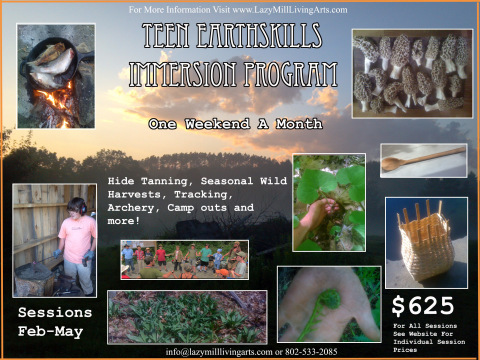
Also, I wanted to draw your attention to our upcoming winter/spring session of Teen Earthskills Immersion Camp, run by our dear friend Luke Boushee. The fall session far exceeded our expectations, and there’s a whole lot more fun in store. Here are more details.

January 4, 2016
It Made All the Difference in the World
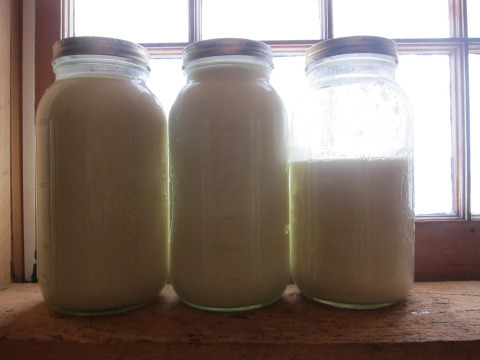
A view inside our refrigerator
The cold dropped like a hammer, and with it that certain stillness of middle winter. I awoke to iced-over windows and kindled a fire before stepping into my chore boots and then down the narrow stairway that services our current quarters.
While I milked, two ravens wheeled overhead; I could hear the rush of the air displaced by their passing. I followed their flight path with my gaze until they reached the old church steeple, then became specks against the backdrop of the snow-white field to the north, then disappeared from view.
My fingers stung from the cold. To distract myself from the pain, I began to compile a mental list of everything we need to do to finish the house, but this soon become more painful than my fingers, so I quit, and then my fingers hurt again, and because I was milking for the pigs, I allowed myself the luxury of dipping them into the bucket of warm milk. I knew the pigs wouldn’t mind, and it made all the difference in the world.

December 29, 2015
Lemmy and Jim
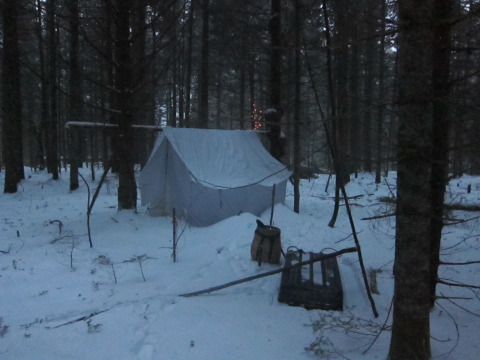
Camp
Snow began in the night, and I did chores in the half-light of a hushed landscape. Down on the town road, I heard the rumble of the plow as it passed, the scrape of the blade, the rattle of the tire chains. I hitched Pip to a fence post and milked, snow falling atop both our backs. I’d slept cold and woken colder, but the warmth of my morning fire stayed with me, and I did not hurry. My family was gone, encamped deep in the woods. I had only the animals and myself to serve.
Back inside, eating my eggs and drinking my coffee, I heard on the radio that Lemmy died. This made me think of my friend Jim, who died nearly five years ago. Jim didn’t listen to Motorhead as often as I did – he was way too classy for that – but it still happened from time to time. It was Jim’s old sawmill that milled much of the lumber we built into the barn I’m sitting in right now. Actually, I can see the sawmill from where I’m sitting right now. I need to get it fired up again; I’ve got a beautiful spalted maple log I’m keen to open up.
Here’s something I wrote about Jim a while back. I hope you like it.
• • •
It has been almost two years since my friend Jim died in his sleep. He was 43 when he died, and less than three weeks away from adopting newborn twin girls with his wife, Nancy. It had taken them nearly four years to line up this adoption. They’d come close to becoming parents before, to babies that for one reason or another had become unavailable at some heart-wrenching last minute. But they’d never come this close. They had a carriage. They had a crib. They even had diapers. This time, it was going to happen.
I didn’t actually know about the impending adoption until after Jim’s death, because I hadn’t talked to him in a couple of months. But that was ok, because that was the sort of friendship we had: We could go a few months without seeing each other, and then fall right back into it. Often we’d come together over a project, or one of the blueberry pies he baked every year for my birthday. I can’t remember how or when that tradition started, but I remember the pies and I remember the company. I remember that Jim would eat three pieces, each with two or three scoops of ice cream. He’d always been like that. The boy could eat.
I won’t say that Jim was my best friend, if only because he had a lot of friends who would claim him as such and I have no more right to that claim than any of them. What’s remarkable, really, is that so many thought of him as their best friend, and I wouldn’t be surprised if he thought of them all as his best friend. He was the sort of guy whose life was big enough for that, whose sense of himself was sound enough that the energy most of us expend just trying to figure out who the hell we are could instead be invested into his relationships with others, like a low voltage electrical current. Which is a funny way to put it, now that I think about it: Jim and Nancy installed renewable energy systems for a living.
So maybe he was and maybe he wasn’t my best friend, but in either case, he was a good friend, and had been for more than 25 years. Jim and I went to high school together; he was a couple years ahead of me, which meant that he graduated at about the same time I dropped out. We both had a fondness for Rush, motorcycles, and driving too fast, in approximately that order. We wanted to be tougher than we were, but we were just too damn sensitive and neither of us could quite muster it. I have no doubt we recognized this in each other, and that it is in part why we sought each other’s company.
In adulthood, Jim and I came to embody some very fundamental differences. He became a strict vegetarian, while I came to be a connoisseur of animal flesh, raising and personally slaughtering my family’s meat. He became an overtly spiritual man, a seeker of and, it seemed to me, a vessel for a particular wisdom that I suspect will always elude me. He was neat, if not meticulous. When he and Nancy bought a new rug for their living room, Jim chose one that was white. A white rug: It was something I could hardly fathom, something that, in my house, would remain unsullied for approximately as long as it took to unfurl. After he died, I was helping Nancy pack up some things and every time I walked across that rug I worried over what might be on the bottom of my shoes. Because damned if that thing wasn’t as white as the day he brought it home so many years before. It was as if that rug had been blessed by Mr. Clean.
But despite all these differences, we remained close. When our oldest son was born, Jim was the first person other than Penny and me to hold him. Our second son took his first steps with his soft fist enclosed in Jim’s big work-calloused hand. Everywhere I look in our house, there is evidence of Jim: The door we built together, the solar panels we installed together, the drywall we hung. Starting in the second week of every August, we pick blueberries from the young whips he helped plant way back in 1998.
Jim and Nancy lived next door to Jim’s parents in a house Jim built before he and Nancy met. It’s an amazing place, full of thoughtful and carefully crafted details. I put in my share of hours during its construction, and one day, as we were working on some task or another, Jim showed me a photo of the slate stone flower he’d fashioned at the roof’s peak. I remember asking Jim why he’d gone to the considerable trouble of making the flower, and then installing it where no one was likely to see it. “Someday after I’m gone, someone will be up on this roof and I want them to know I cared,” is what he said. I said nothing. I mean, what the hell could I say to that?
After his death, Jim’s family did an amazing and unusual thing: They left his body where it lay, in Jim and Nancy’s bed, for three full days. And Nancy invited anyone and everyone to come say goodbye. Or hello. Or whatever they wanted. I remember sitting on the bed with my friend, crying my friggin’ eyes out. I remember how at first I’d thought that maybe I couldn’t do it, couldn’t handle seeing his body like that, in his bed, exactly as he died. I remember thinking that I couldn’t imagine how his family could just leave him there and open the door. But sitting there with him, and gathering with so many of the people whose lives had somehow become intertwined with his (and it was a lot), I realized I couldn’t imagine it being any other way.
Three days after he died, we lifted Jim into a homemade coffin and buried him on the land. That was another thing I wasn’t sure I could handle and yet another thing that, having done it, I couldn’t imagine not having done. It poured that day, as it had on so many of the previous days, and we pumped hundreds of gallons of water out of the hastily excavated gravesite, a steady, brown stream of collected rain and diluted soil, and I thought about how Jim’s body would eventually merge with the earth just as the soil and water had merged. And then I realized how I’d unconsciously begun to distinguish between Jim and Jim’s body. I tried to pinpoint when this had happened, but I couldn’t.
We set the coffin into the ground and started backfilling. The soil was wet and heavy in the palm of my spade. For the time, it had stopped raining, but we could see the next wave of clouds building in the sky. Penny took a turn with the shovel. Jim’s father was next to me, shoveling. The soil thumped against the coffin lid. It made a noise that reminded me of a horse’s gallop. Claudia, another of Jim’s best friends, starting singing “Swing Low, Sweet Chariot.” We all joined in.
Two weeks later, I was at the hospital with Jim’s family and a handful of friends, awaiting the arrival of the twins Nancy would adopt.
Not long after the twins arrived, and not long after my grief had evolved into gratitude in the way that all grief deserves to evolve, I had a dream about Jim. It was short, or at least the portion I remember was short. He was sitting in one of the wooden Adirondack chairs my parents gave Penny and me for our wedding. I was above him, from some undefined vantage point. Was I in a tree? Maybe. On a ladder? I don’t think so, but it could be. Perhaps I was merely levitating. Whatever the case, my view of Jim – and not just his physical being, but everything about him – was complete. He was wearing the big, mirrored aviator sunglasses he used to wear and his hair was pulled back into his trademark ponytail. His face was tilted toward the sky, but he could not see me. And he was laughing.

December 28, 2015
Then We’d Have Pie
On Christmas Eve I drove through the darkening streets of a small town not far from home. The roads were wet with the remnants of a passing storm, and the wind had blown with such force that a tree had fallen atop a power line. Now the electricity was out, and there was something comforting in the sight of all those unlit store windows, as if, at 4:30 in the afternoon, everybody had already gone home to stoke the fire and put the kettle on for tea. But of course the roads and sidewalks were still busy, and I felt a small, passing sadness for those who had counted on these last few minutes of electronic commerce to fulfill their gift-giving obligations.
Once home I stoked my own fire, filled a pot of water to heat for dishes, ground coffee, spooned lard into a skillet, then cut an onion into crude slices with my pocketknife. When the pan was hot, I dropped in the onion and salted it down. Let it burn a little at the edges. Then the steak, a ribeye latticed with fat in gelatinous veins. I tossed a stick of paper birch on the fire to bring some quick heat. The onion and steak and lard were throwing a bit of smoke, but I sat back and let it rip just until the fat was crisped up nice and the inside was still a half-shade darker than red. Almost purple, really. Warm-ish. The coffee bubbled on the stove.
I sat by the stove and ate from the pan with fingers and knife, drinking black coffee and considering the temptation of further retreat. There are times I see a small cabin, a length of off-kilter stove pipe jutting from a wall, shotgun hanging on a peg by the door. Somewhere along the way toward inhabiting this cabin, I took up pipe tobacco and swore off shaving. You’d have to walk a good 20 minutes into the woods to find my family and me, and it’d be all uphill, and for half of those 20 minutes we would’ve known you were coming by the preceding birdcalls. We’d invite you in, serve stew thick with last year’s potatoes and hunks of indeterminate meat. “What’s this?” you’d ask, holding forth your laden spoon, and in answer I’d exhale a cloud of pungent smoke and raise my eyebrows. Let your imagination run wild.
Way up there in the woods, with the trees and encroaching darkness and pipe smoke insulating us from this crazy, mixed-up world where everyone seems so damn frightened (and therefore, it seems, angry) all the time, and worse yet for all the wrong reasons, we’d eat until our bellies are full-to-bursting. We’d sit a spell, listen to the sounds of the on-coming night, and tell the stories that have been told so many times before. You know the ones I’m talking about.
Then we’d have pie.
• • •
I’ll leave you with a few gems from an interview with Stephen Jenkinson, in the August ’15 issue of The Sun. I highly recommend it.
The dominant culture of North America is not being killed by global warming or too few whales or anything like that. It just doesn’t know how to live, how to take up the task of loving life, even how to grieve its own grievous history.
North Americans need a great awakening. What we thought was so isn’t so; what we once believed to be true isn’t true and never was. Here are some of the lies we’re told: There’s enough for everyone; we’ve just got a distribution problem. As long as we pay the sticker price for something, we’re entitled to have it. We get of a vote in anything of real significance or importance. Dying is a rupture in the natural order of things.
Health is not the absence of disease or hardship or brokenness. Health includes all of that. It includes dying… I see our health as like a tripod, a dynamic thing: One leg is your relationship with all other human beings. It’s not possible for you to be healthy when there are people living under a freeway overpass in cardboard boxes. Your health is dependent on theirs. The second leg is your relationship with all in the world that’s not human. If you have only these two legs, you can try to live a good life, but it’s like walking on stilts. The third leg is what gives you a place to rest, and that leg is your relationship with the unseen world, everything not described by the other two. Having all three constitutes health. That’s where it lives. This tripod sustains you. You don’t exist as an individual without these relationships.

December 17, 2015
I Visit the Cows
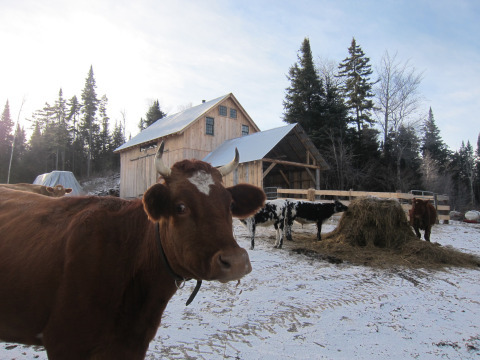
Skeptical
The current stretch of warmth seems unconquerable and at times surreal. Even the nights remain above freezing, and we live amidst a sea of mud, wallowing our way from barn to house, in reverse of historical norms. “That’s how they used to do it,” is what the old timers say when I tell them we’re living in the barn while we build the house. I think their tone is one of nostalgia, but I could be wrong: It could be pity.
Last night our friend Michael came over with a sill he’d made for our front door and we worked by headlamp to install the jamb and hang the door. As we worked, the misting rain made a partial turn toward snow, and we moved quickly, our movements made efficient not only by our individual embodied knowledge, but also by a deep familiarity with one another’s habits.
Michael and I have worked together a fair bit over the years, and it occasionally feels to me as if we operate as extensions of one another, each of us anticipating the others’ next move, quick to have the appropriate tool at hand or a measurement at the ready. His skills are greater than mine (he is a full-time builder and logger), but not so much greater that we cannot work as near-equals, and not so much greater that I cannot understand what he’s doing and why. For this reason, I rarely fail to glean some little nugget or another from working with Michael, and this is pleasing to me. So too does the fact that Michael and I do not want for laughter as we work.
Charles wrote a great essay on the fallacy of numbers-based climate accounting; you can find it here. I don’t have much to add, except that while reading it, I was unable to avoid considering the parallels between the ways we talk about and quantify climate and the ways we talk about and quantify education.
Charles writes: … by focusing on a measurable quantity we devalue that which we cannot measure or choose not to measure. Such issues such as mining, biodiversity, toxic pollution, ecosystem disruption, etc. recede in urgency, because after all, unlike global levels of CO2 they do not pose an existential threat. Certainly one can make carbon-based arguments on all these issues, but to do so is to step onto dangerous ground. Imagine that you are trying to stop a strip mine by citing the fuel use of the equipment and the lost carbon sink of the forest that needs to be cleared, and the mining company says, “OK, we’re going to do this in the most green way possible; we are going to fuel our bulldozers with biofuels, run our computers on solar power, and plant two trees for every tree we chop down.” You get into a tangle of arithmetic, none of which touches the real reason you want to stop the mine — because you love that mountaintop, that forest, those waters that would be poisoned.
I am certain we will not “save our planet” (or at least the ecological basis of civilization) by merely being more clever in our deployment of Earth’s “resources”. We will not escape this crisis so long as we see the planet and everything on it as instruments of our utility. The present climate change narrative veers too close to instrumental utilitarian logic — that we should value the earth because of what will happen to us if we don’t. Where did we develop the habit of making choices based on maximizing or minimizing a number? We got it from the money world. We are seeking to apply our numbers games to a new target, CO2 rather than dollars. I don’t think that is a deep enough revolution. We need a revolution in means, not only a revolution in ends.
Our culture’s contemporary model for education is also derived from the money world, which is to say it is engineered to transform children into productive economic units. Whether or not our dominant educational system does this effectively is entirely open to debate, but there is little doubt that creating an employable workforce is its primary objective. Perhaps not its only objective, but certainly the one that prevails above all others.
The problem with measuring a child’s education in numerical terms is the same as the problem with measuring the climate in numerical terms: We can only measure what we know how to measure, and therefore, we are trapped in a vacuum of the quantifiable, in the process devaluing that which exists beyond the vacuum, if we’re even able to acknowledge its existence at all. I suppose that’s just a fancy way of saying we don’t know what we don’t know. Or how about this: We don’t feel what we no longer know is possible to feel. Yes. That, too.
This is one of the reasons I become so frustrated when those who’ve chosen alternative educational paths insist on touting the “success” of their children in the context of that vacuum. It is also one of the reasons that I no longer talk much about our educational choices and experiences: I have come to understand that most people want answers I cannot provide, and frankly am not terribly interested in trying to provide. It is almost as if we speak different languages. No doubt it is as indicative of my close-mindedness that I no longer attempt to speak their language as it is of theirs that they do not attempt to speak mine. But there are only so many hours in the day and many ways to pass them.
There is, of course, a correlation between our numbers-based understanding of education and so-called educational solutions and our numbers-based understanding of climate and so-called climate solutions. They are joined at the hip, and, as I suspect Charles might agree, meaningful change in one is unlikely to occur without meaningful change in the other. As to whether these changes happen consecutively or concurrently, well, your guess is as good as mine. As to whether they happen despite or because of our actions and intentions, again, I have no idea.
But most days I do believe they will happen, and that when they do, we will, as Charles writes … realize the importance of those things that we’d relegated to low priority: the mangrove swamps, the deep aquifers, the sacred sites, the biodiversity hotspots, the virgin forests, the elephants, the whales… all the beings that, in mysterious ways invisible to our numbers, maintain the balance of our living planet. Then will we realize that as we do to any part of nature, so, inescapably, we do to ourselves. The current climate change narrative is but a first step toward that understanding.
And on the days I do not believe these things will happen? That’s simple: I visit the cows.

December 15, 2015
Update
The spoons are sold out; Rye thanks you. He is not taking any more custom orders until he gets on top of his current backlog. Sorry for the delays in getting back to some of you. We remain (mostly happily) without internet access at home.

Ben Hewitt's Blog
- Ben Hewitt's profile
- 37 followers




